News - University of Arkansas
June 2019 GLOBE News Brief
June 2019 GLOBE News Brief
|
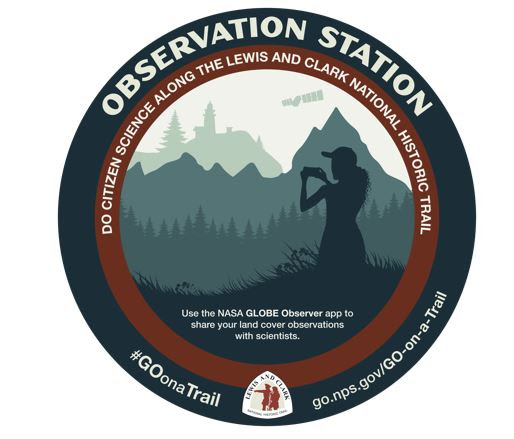
The Lewis and Clark National Historic Trail and NASA GLOBE Observer are challenging visitors to collect land cover observations along the trail between 01 June and 02 September 2019. To participate, simply download the GLOBE Observer App, open the Land Cover tool, and start taking observations to earn points.
Share Your Observations! Your observations will be shared with researchers and other citizen scientists. Participants who collect the most points will receive a certificate and prize package.
To download the GLOBE Observer App, click here.
To learn more about the challenge, including how to collect points, click here.
To view land cover observations that have already been submitted, click here.
News
New York Academy of Sciences Article, “Wisdom of the Crowd: Citizen Science in the Digital Age”
Highlights GLOBE’s Enduring Efforts
GLOBE Implementation Office Director Dr. Tony Murphy
A recent article published by The New York Academy of Science (NYAS), “Wisdom of the Crowd: Citizen Science in the Digital Age,” highlights The GLOBE Program and the enduring value of the program’s data-collection efforts.
“The term ‘citizen science’ first entered the Oxford English Dictionary in 2014, but it describes a long standing tradition of collaboration between professional and amateur scientists,” the author, Richard Birchard (NYAS staff), stated in the article.
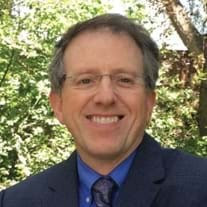
GIO Director Dr. Tony Murphy
Ana Prieto, a former high school science teacher and GLOBE program volunteer in Argentina was featured in the article. “The data we collect varies depending on our research,” Prieto said. “We’re currently taking land cover measurements in the field, and in the summer we will start taking hydrology measurements. This provides students with first-hand scientific knowledge.”
Citizen science data is used for a variety of reasons, GLOBE Implementation Office Director Dr. Tony Murphy explained in the article. “We collaborate with NASA Scientists and Science Missions. One example is the August 2017 North American eclipse. NASA scientists are looking at the temperature data collected to see the impact of the eclipse on air temperature and solar radiation. Another use is data gathered on mosquito larvae detection and identification, which is then used to help local communities combat the spread of mosquito-borne diseases by identifying and eliminating sources of standing water, such as containers and spare tires, in which mosquitoes breed.”
“It's important to get people involved, get them outside, using technology in a positive way for an educational purpose,” Dr. Murphy said.
To read the full article, click here.
2019 IVSS Update: Record Number of Projects Submitted;
Stipend Drawing Winners Announced

Record Number of Projects
The deadline for submitting projects to the 2019 International Virtual Science Symposium (IVSS) was 10 April – and GLOBE received a record number of projects! There were 235 projects, from 26 countries, submitted. In addition, 114 judges provided feedback on more than three projects. Virtual badges have been posted, and feedback and certificates have been sent to teachers.
To view the 2019 IVSS Reports, click here.
To view the 2019 IVSS judges, click here.
Stipend Drawing Winners
On 17 May, seven projects were selected to receive stipends to help with costs to attend the GLOBE Annual Meeting in Detroit, Michigan, USA. These seven projects all received a four-star student research badge and at least two other optional badges. The selected projects are:
· Africa Region (Zinder, Niger; IPF Kaoura-Matamèye): “Typology and evolution of the number of mosquito habitats in Matameye”
· Asia And Pacific Region (Phatthalung, Thailand; Papayom Pittayakom School): “Effects of heavy metals on plankton, water quality and fish in Pak-pra canal, Phatthalung province, Thailand”
· Europe and Eurasia Region (Langon, France; Collège Jules Ferry): “Toujours le vin sent son terroir/California and Bordeaux vineyards comparison”
· Latin American and Caribbean Region (Canelones, Uruguay; Escuela No. 88 Alfredo B. Nobel): “Water quality in nearby areas to canelones city through the use of macroinvertebrates as bioindicators”
· Near East and North Africa Region (Jeddah, Saudi Arabia; The 128 Intermediate Gifted Girls School at Jeddah): “The effect of water salinity levels on water acidity (pH) and water conductivity in Jeddah”
· North America Region (Norwalk, Ohio, USA; Main Street Intermediate School): “How does elevation affect surface temperature?”
· North America Region (Gibraltar, Michigan, USA; Shumate Middle School): “Three year volumetric soil moisture study”
To learn more about these projects, click here.
Congratulations to everyone who participated in the 2019 IVSS!
Have You Booked Your Room for the 2019 GLOBE Annual Meeting?
Deadline to Reserve a Room within the GLOBE Room Block is 20 June!
Meeting Registration Closes 01 July
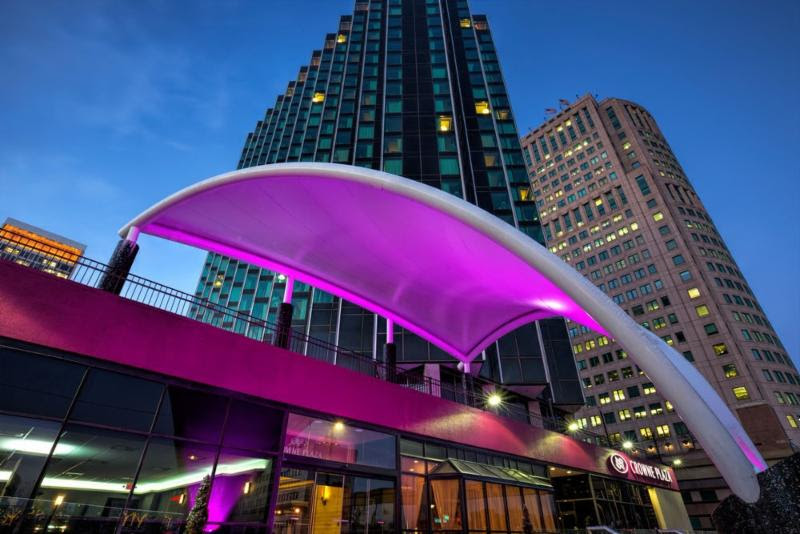
Crowne Plaza Detroit Downtown Riverfront Hotel
Planning on attending the 2019 GLOBE Annual Meeting? The deadline to reserve a room within the GLOBE room block at the Crowne Plaza Detroit Downtown Riverfront Hotel is 20 June! The standard non-smoking room rate, with group discount, is $139 USD per night.
To make your reservation, click here.
The theme of this year’s meeting, which will be hosted by Dr. Kevin Czajkowski and David Bydlowski, is “Intersections of Diverse Environments.” Detroit is a city positioned at the intersection of multiple types of diverse environments culturally, geographically, and economically – which is why the theme will be explored in multiple strands: Finding Nature in Urban Landscapes; Exploring Changing Environments; GLOBE and Technology; and GLOBE Gives Back.
To learn more about the GLOBE Annual Meeting (#GLOBE23), click here.
Meeting registration closes 01 July!
12 June: Trees Around the GLOBE Campaign Webinar “Lessons from a Southern Old-Growth Bottomland Forest – Live from
Congaree National Park”
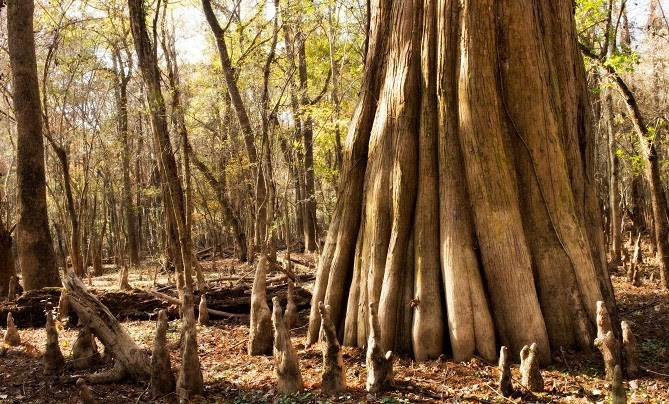
On Wednesday, 12 June, the Trees Around the GLOBE Student Research Campaign webinar “Lessons from a Southern Old-Growth Bottomland Forest – Live from Congaree National Park,” will be held at 2:00 p.m. EDT (6:00 p.m. UTC).
Congaree National Park (www.nps.gov/cong) protects the largest intact remnant of southern old-growth bottomland (floodplain) forest remaining in North America. Similar forests once covered over 35 million acres of river bottoms in the Atlantic and Gulf coastal plains and up the Mississippi River Valley. Some of the park’s champion trees are 700 to 1,000 years old. The park is also home to the National Park Service Old-Growth Bottomland Forest Research and Education Center, which facilitates research and scholarship related to forest ecology, environmental history, and more. During the webinar, Dr. David Shelley, Center Director, will highlight some key findings, unanswered questions, and park management challenges – as well as a few personal lessons from the forest.
To register for the upcoming webinars and to receive emails about future webinars, click here.
All the webinars can be joined at https://zoom.us/j/7578241037.
(If you have missed previous webinars, click here.)
Join the June GLOBE Mission Mosquito
Education and Citizen Science Webinars
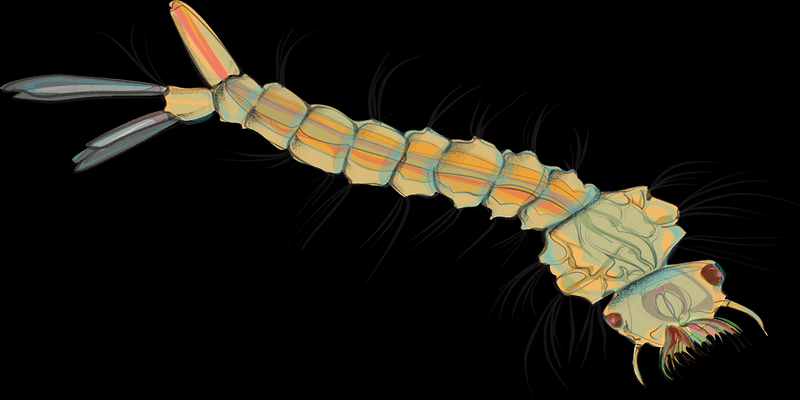
GLOBE educators and citizen scientists (of all ages) – you are invited to join the following GLOBE Mission Mosquito (GMM) June webinars:
GMM Education Webinar #8 “Checking Out the Buzz” – Wednesday, 05 June (2:00 p.m. EDT/7:00 p.m. UTC): During this webinar, participants will experience science projects related to mosquitoes submitted by GLOBE students. In addition, students will describe their research and a few “lessons learned.” Participants will also discuss ideas on how to keep the “buzzing” excitement going over the summer.
To register for the webinar, click here.
GMM Citizen Science Webinar #6 “What to Do About Data?” Wednesday, 19 June (2:00 p.m. EDT/7:00 p.m. UTC): Don’t know what to do with your data? Join Dr. Becky Boger, who will introduce open source mapping tools, and lead a tutorial so you can create maps of your data.
To register for the webinar, click here.
To learn more about the GLOBE Mission Mosquito campaign, and to view archived webinars, click here.
South American Eclipse 2019 – June Webinar: “How Cool is the Eclipse? Collect Data with GLOBE”
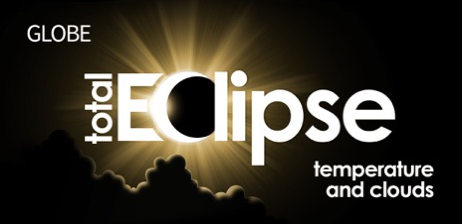
On 02 July 2019, a total solar eclipse will pass across the southern part of South America. The eclipse will begin over the Pacific Ocean, and the lunar shadow will enter South America near La Serena, Chile, and will end near Chascomús, Buenos Aires, Argentina. Outside this path, a partial solar eclipse will be visible in the rest of Chile and Argentina, as well as in Ecuador, Peru, Bolivia, Paraguay, Uruguay; and in parts of Colombia, Brazil, Venezuela, and Panama.
On Thursday, 06 June (9:30 a.m. EDT/13:30 UTC), the webinar “How Cool is the Eclipse? Collect Data with GLOBE” will be presented. This is Webinar #2 in a series of webinars that are intended for GLOBE teachers and students in South America (especially Argentina and Chile; however, they are open to anyone who is interested) to learn about eclipses, to prepare to collect GLOBE data, and to get some tips for analyzing the data they collect. The webinars will be held in Spanish.
To register for the webinar, click here.
To view the main page for webinars, including Webinar #1 “Introduction to Eclipses,” click here.
Even NASA’s Top Scientists Need a Little Back-Up Sometimes!
Watch Bonus Episode of NASA Explorers Digital Series
“Cryosphere: Cryo Kids”
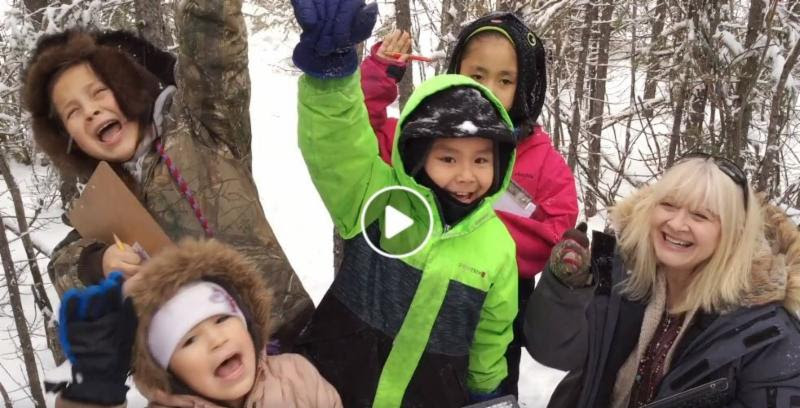
NASA Explorers come in all ages! In a bonus episode of NASA Explorers: Cryosphere –
Cryo Kids, NASA scientists headed to rural Alaska to check in with some of the program’s tiniest Explorers. These energized explorers are following in the scientists’ footsteps, and working with The GLOBE Program to conduct frost tube experiments designed to measure when and where snow and ice are freezing.
NASA Explorers is a new digital series that takes you inside the space agency and follows the pioneers, risk-takers, and experts at the frontline of exploration. Season 1, “Cryosphere,” joins NASA scientists on their journey to the frozen ends of the Earth as they study our rapidly changing world from satellites, planes, and boots on the ground.
To watch the bonus episode, click here.
U.S. Teachers: Thank You for Participating in the
2019 Teacher Watercoolers
U.S. GLOBE Teachers: The GLOBE Program would like to thank you for participating in the 2019 Teacher Watercoolers, which focused on sharing ways GLOBE teachers around the country use GLOBE with their students.
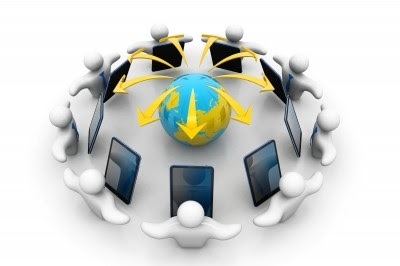
If you missed a Watercooler, or would like see what they are all about, videos are posted on the Teacher Watercooler YouTube playlist. To view these, click here.
We are looking forward to further building this community next year!
(To find out how you can get involved next year, email Haley at: hwicklein@gmail.com)
GLOBE Zika Education and Prevention Project June Update

Colombia, Brazil, and Peru Organize GLOBE Zika Education and Prevention Project Country Mosquito Training “Triple Frontier”
The Latin America and Caribbean (LAC) Region continues to demonstrate strong regional collaboration in the GLOBE Zika Education and Prevention Project. On 03 May, Colombia, Brazil, and Peru organized a “Triple Frontier” Country Mosquito Training (CMT) in Leticia, Colombia. Over 130 individuals participated in the workshop, where they received training on how to use the GLOBE Observer Mosquito Habitat Mapper App for mosquito larvae species identification and mosquito habitat elimination. Triple Frontier attendees included community leaders, public health officials, teachers, and students. This is the second “Triple Frontier” CMT for the LAC region. Argentina, Brazil, and Paraguay organized the first “Triple Frontier” CMT in August 2018, training over 60 individuals. The GLOBE Program acknowledges Mr. Carlos Acuña Caldera (Colombia Country Coordinator), Dr. Nadia Sacenco (Brazil Country Coordinator), Mr. José Martín Cárdenas Silva (Peru Country Coordinator), and Ms. Mariana Savino (LAC Regional Coordinator for the Zika Education and Prevention Project) for their collaborative leadership on this event.
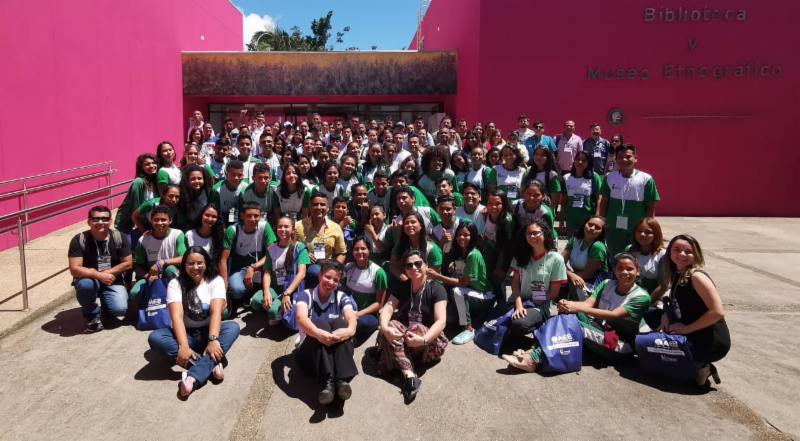
GLOBE “Triple Frontier” Zika Education and Prevention Project Mosquito Training
Student Teams Submitting Mosquito-related Research Reports to the GLOBE 2019 International Virtual Science Symposium Selected to Present at GLOBE’s 23rd Annual Meeting
Students from the 30 countries participating in the GLOBE Zika Education and Prevention Project submitted a total of 18 mosquito-related research projects for the GLOBE 2019 International Virtual Science Symposium (IVSS). The student reports offered a wide range of research topics, including mosquito behavior analysis (combining protocols from the GLOBE mosquito protocol bundle); collecting mosquito species-type and quantity data over diverse geographic regions; and providing community-specific education and engagement recommendations to reduce the spread of mosquito-borne diseases. GLOBE would like to thank all of the students, teachers, and advisors for their mosquito-based IVSS report submissions.
Two student teams from each of the regions participating in the Zika project were selected to present their mosquito research at GLOBE’s 23rd Annual Meeting:
· Africa Region: Kenya (St. Scholastica Catholic School): “Research on mosquitoes and diseases they transmit” and Madagascar (University of Antanananarivo): “Surveillance of Aedes albopictus mosquitoes vectors of ZIKA in urban area”
· Asia and Pacific Region: Philippines (Batasan Hills National High School): “Community-based mosquito Vector prevention model: conceptual approach to mitigating the risk of mosquito threats thru community empowerment and education” and Thailand (Montfort College Primary Section): “Dengue situation with different ecological and environmental factors in the sub-district in Chiang Mai, Thailand”
· Latin America and Caribbean Region: Argentina (Science Club Huechulafquen): “Distribution and abundance of mosquitoes in the world. Preliminary report” and Colombia (Colombia GLOBE v-School): “Comparative studies of larvae of mosquitoes present in the gardenia's urbanization, barranquilla-colombia”
GLOBE Zika Education and Prevention Project Mosquito Training and Data Points Metrics
As of May 2019, countries participating in the GLOBE Zika Education and Prevention Project have organized over 120 CMTs and 25 Local Mosquito Workshops (LMWs); collectively, they have added 81,300 data points to the GLOBE Observer Mosquito Habitat Mapper App. The GLOBE Program acknowledges the 30 participating countries and their ongoing work to support the project objectives to: limit the spread of the Zika virus; engage local communities in mosquito education and habitat elimination; and add 100,000 mosquito data points to the GLOBE database.
To learn more about the GLOBE Zika Education and Prevention Project, click here.
To follow along, and share your project updates on social media, use #GLOBEZika
Read the Latest GLOBE Community Blog “Did You Dump Out the Water? When to Answer “No” to Eliminating a Mosquito Breeding Site When Using the GO Mosquito Habitat Mapper”
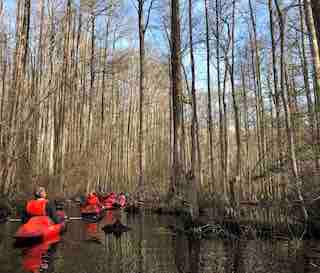
In a recent GLOBE Community Blog, Dr. Russanne (Rusty) Low, GLOBE Mission Mosquito Science Lead, answers questions submitted by community members using the GLOBE Observer(GO) Mosquito Habitat Mapper tool regarding what to do when mosquitoes are found in a natural habitat, such as an estuary or wetland.
“When you use the Mosquito Habitat Mapper and your mosquito observations are finally logged,” Dr. Low states in the blog, “you are then prompted to do Step 4, ‘Eliminating Mosquito Breeding Habitat. By dumping or treating water you can significantly decrease the spread of mosquitoes’.”
“It’s important to clarify that Step 4 is referring to artificial or natural containers and human created water impoundments. Examples of water impoundments include things such as stock and cattle watering holes (an important source of mosquitoes in areas in the U.S. west), irrigation ditches (a primary source of the mosquitoes that transmit West Nile virus in Colorado, USA), and artificial ponds and water sources that are landscaping features on public and private lands. These sites collect water for an established purpose and we aren’t suggesting that you remediate these sites. When you are recording these mosquito habitat sites, the right answer is to just say “no,” she states.
To read the entire blog, click here.
To read other recent community blogs, click here.
What’s your GLOBE story? As a vital part of the GLOBE community, you are cordially invited to blog on the GLOBE website. Respectfully voice your opinion, ask questions, share tips and tidbits – and make meaningful connections with members of the community today. The GLOBE Community Support Team (CST) has recorded an updated demonstration video on how to create your blog post.
To watch the video, click here.
We want to hear your GLOBE story today!
Students Across Ireland Measure Air Quality as Part of
GLOBE Air Quality Campaign 2019
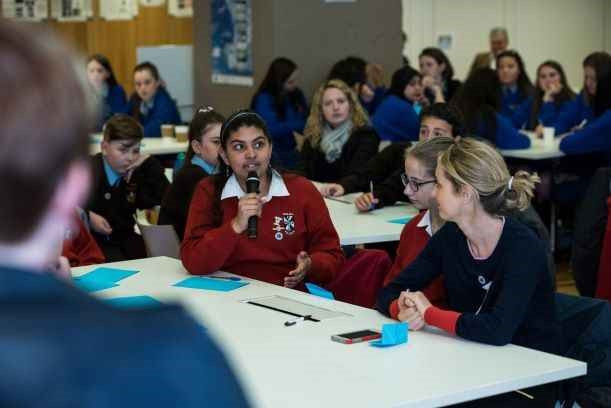
As part of the GLOBE Air Quality Campaign 2019, students from 30 schools across Ireland measured air quality at locations around their schools. Students measured nitrogen dioxide (NO2) – a principal pollutant from car exhaust emissions – during the month of February, and investigated the results and potential impacts on their health and well-being.
Overall findings indicated generally good air quality, and for most schools the results ranged from excellent to pretty good. NO2 levels were higher for schools situated in major towns and cities when compared to schools located in rural areas. Students noted a deterioration in air quality at the school gate (where cars congregate to pick up and drop off students) when compared to more sheltered areas, such as school yards.
Students researched and analyzed their data and produced reports for the GLOBE Air Quality Event at Woodquay, Dublin. At the event, they exchanged information and ideas for how to further investigate their local air quality and come up with solutions for reducing air pollution. Some of the ideas put forward for action included: promoting active travel to school, such as cycling and walking; encouraging more public transport and private buses to schools; car sharing, and more investment and support for electric vehicles.
Speaking at the event, Michael-John O’Mahony, Director of An Taisce’s Environmental Education Unit, congratulated students on the quality of their scientific investigations and recognized the importance of The GLOBE Program in giving students opportunities to carry out meaningful investigations of their local environments. “Well done to all the students and teachers who contributed to the air quality campaign,” O’Mahony said., “You are leading the way in better understanding Ireland’s air quality and threats to it. GLOBE is providing an excellent citizen science platform for schools across Ireland to better understand and measure their local environments and we expect many more schools to engage with the program as it grows and develops in the future.”
At the event, Laura Burke, the Director General of the EPA said, “The research carried out by GLOBE schools is important and useful work and it will help us in the EPA to protect Ireland’s clean air. Protecting and improving our environment is important for lots of reasons: it is core to keeping our people healthy and safe and it is vital for successful business. Increasing our awareness about air quality can also help us engage people in talking about climate change, which is the key environmental issue of our time. This is why we decided to focus on air quality measurements when we launched GLOBE in partnership with An Taisce in 2017.”
Addressing the students, Burke said, “Through your work you are making an important contribution to protecting our shared environment. You are the scientists of the future and you can make a difference."
One of the participating schools will be selected to represent Ireland at the upcoming GLOBE Annual Meeting in Detroit, Michigan, USA, In July 2019.
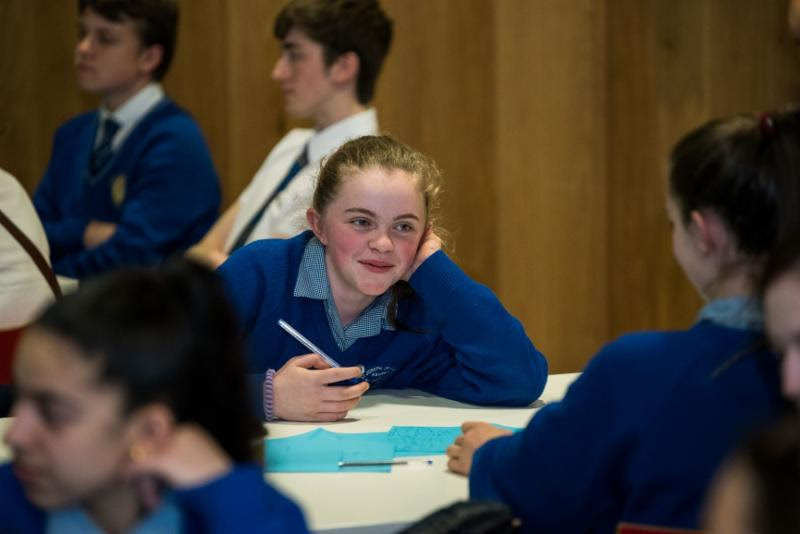
Elementary School Teachers: New “Cloud” Teaching Box Available
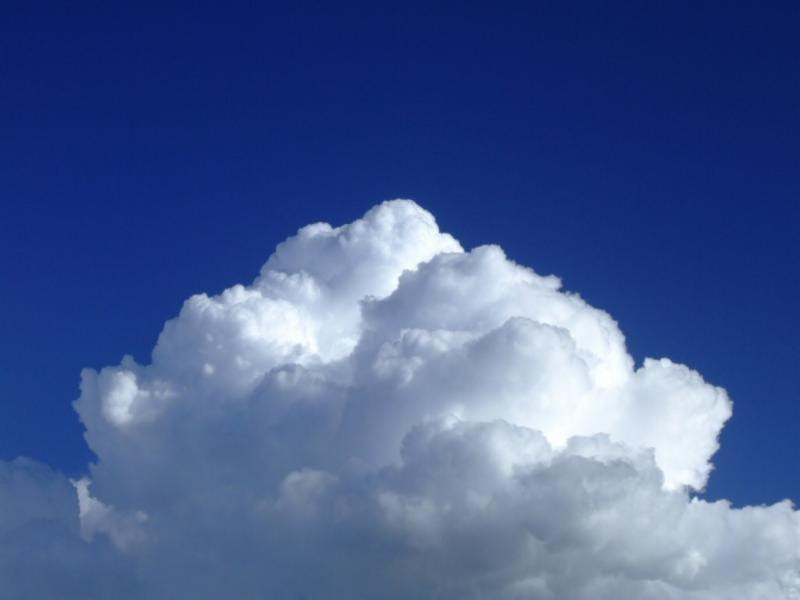
A new University Corporation for Atmospheric Research (UCAR) Center for Science Education (SciEd) “Cloud” Teaching Box (for elementary school students) is now available.
UCAR teaching boxes are collections of classroom-ready and standards-aligned activities, content, and multimedia that build student understanding of science, technology, engineering, and math. All materials are freely available online.
Clouds are both universal and mysterious. The science of clouds helps students feel closer to the sky and in awe of nature as they learn elementary concepts of physics, the water cycle, and atmospheric science. Students can also become citizen scientists and make cloud observations with the GLOBE Observer App. Explore educational resources in the Cloud Teaching Box and bring cloud science to your elementary students.
To check out this new Teaching Box, click here.
NOAA’s Adopt a Drifter Program Engages Schools in Ocean Climate Science – Adopt a Drifter Today
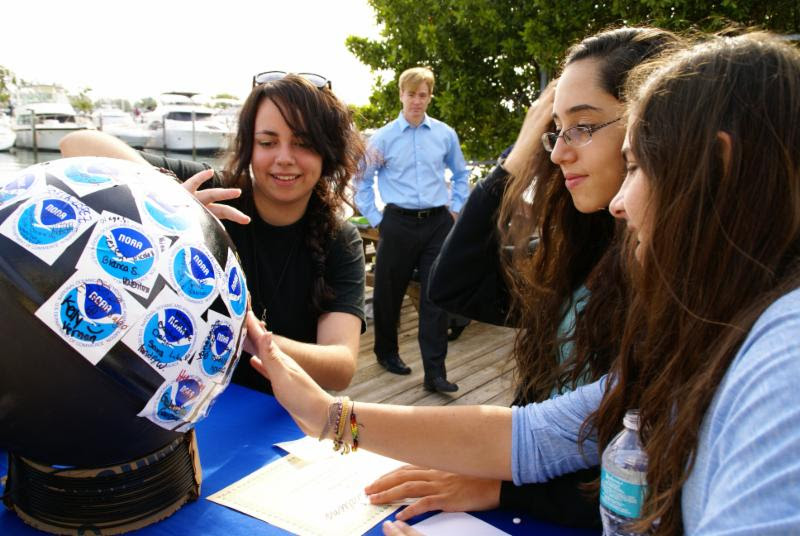
The mission of the National Oceanic and Atmospheric Administration’s (NOAA’s) Adopt a Drifter Program (ADP) is to establish scientific partnerships between schools around the world and to engage students in activities and communication about ocean climate science. GLOBE schools are invited to adopt a drifter today!
What is a drifter? A drifter (or a drifting buoy) is a piece of scientific equipment that collects data on the ocean’s surface. Drifters allow scientists to track ocean currents and changes in temperature, salinity, and other important components of the ocean’s surface as they float freely and transmit information.
The ADP was started in 2004 for K-16 teachers. The free program links together schools from the United States and around the world to learn more about ocean temperature and currents. A global array of 1,250 drifting buoys was successfully completed in 2005. In order to maintain the array at its complete level, ongoing deployment of drifting buoys is necessary to replace those that eventually expire.
To read more about the program, click here.
For potential lesson plans, click here.
If you’re interested in joining the program, click here.
If you have any questions, please email Emily Smith (ADP Coordinator) at: emily.a.smith@noaa.gov.
05 June is World Environment Day
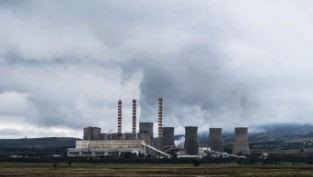
The theme of this year’s World Environment Day, 05 June, is “Air Pollution.” World Environment Day is the United Nation’s most important day for encouraging worldwide awareness and action for the protection of our environment. Since it began in 1974, it has grown to become a global platform for public outreach that is widely celebrated in over 100 countries.
This year, the event is being hosted by China. Every World Environment Day has a different global host country, where official celebrations take place. The focus on the host country helps highlight the environmental challenges it faces, and supports the effort to address them. In recent years, millions of people have taken part in thousands of registered activities worldwide.
To learn more, and to take part in these critical endeavors, click here.
Opportunities for Teachers
(U.S. opportunities are often highlighted in the News Brief simply because we are more aware of them through our local media; however, if there are opportunities for GLOBE students and/or teachers in your region that you would like us to highlight in the coming months, please send the information to: communications@globe.gov. Thank you!)
NASA STEM Educator Webinars
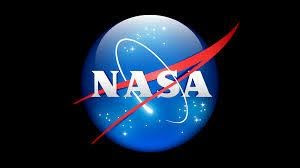
The NASA STEM Educator Professional Development Collaborative (EPDC) is presenting a series of webinars open to all educators. All pre-service, K-12, and informal educators, as well as university faculty, are invited to join NASA education specialists to learn about NASA missions, activities, lesson plans, educator guides, and online resources that integrate NASA and STEM into the classroom.
An upcoming webinar, “Moon to Mars: NASA STEM Geology-Meteorite Mysteries,” is geared toward educators in grades 5-12. On Thursday, 27 June (5:00 p.m. ET), the NASA EPDC at Texas State University is providing a one-hour webinar. Engage students in inquiry science and explore interdisciplinary connections. The study of meteorites provides a unifying theme that links almost every aspect of Earth and planetary science with mathematics, physics, chemistry, and even biology. The effects of meteorite impacts have serious implications for social science.
Upcoming 2019 GLOBE Teacher Training Workshops
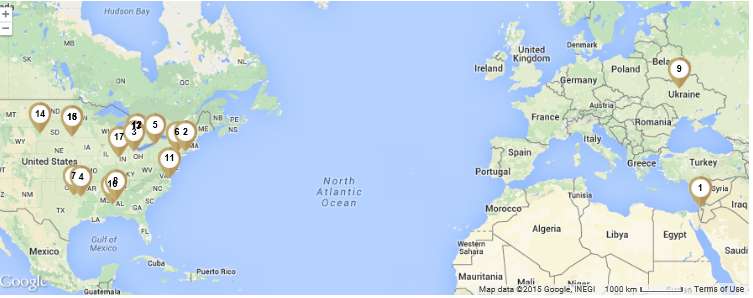
Some of the upcoming GLOBE teacher training workshops include:
· Denver, Colorado, USA (MULTI STEM Train-the-Trainer): 04-06 June (restricted attendance)
· Tuskegee, Alabama, USA (K-2, 3-5, 6-8 Science Year Training) 04-07 June (open to all)
· Florence, Alabama, USA (K-5 Science Year 2 Training): 04-12 June (open to all)
· Mansfield, Ohio, USA (GLOBE Mission EARTH: GLOBE Urban Protocol Bundle Training) 10-14 June (open to all)
· Fayetteville, Arkansas, USA (Hydrology and Land Cover) 17-19 June (restricted attendance)
· Wall, South Dakota, USA (Science and Storytelling in the Badlands): 18-21 June (open to all)
· West Lafayette, Indiana, USA (Integrating STEM in the Environment): 23-26 July (open to all)
No training workshops in your area? Check out GLOBE’s protocol eTraining. (In order to enter GLOBE data, GLOBE users must complete the necessary training either by attending a GLOBE workshop or by completing the required online eTraining modules. Once your training is complete, you will be ready to start entering your measurements – and will be joining a community of thousands of teachers around the world!)
Anniversaries

Congratulations to the 13 GLOBE countries celebrating anniversaries of successful GLOBE implementation during the month of June
Argentina – 24 years
28 June 1995
Bahrain – 18 years
16 June 2001
Republic of Botswana – 01 year
26 June 2018
Brazil –04 years
30 June 2015
Republic of Congo – 14 years
28 June 2005
Dominican Republic – 22 years
20 June 1997
Estonia – 23 years
19 June 1996
Ireland – 24 years
12 June 1995
Kenya – 22 years
9 June 1997
Kyrgyz Republic – 24 years
9 June 1995
Madagascar – 22 years
11 June 1997
Monaco – 19 years
29 June 2000
United Arab Emirates – 20 years
06 June 1999
Connect with Us
Send us news that you would like to share with the GLOBE community and we'll include it in next month's News Brief. Be sure to include photos too.
Email us at: communications@globe.gov.
Be sure to follow us on social media! Find us on Facebook, Instagram and Twitter.
News Topics: News Briefs type: globe-newsNews origin: GLOBE Implementation Office





